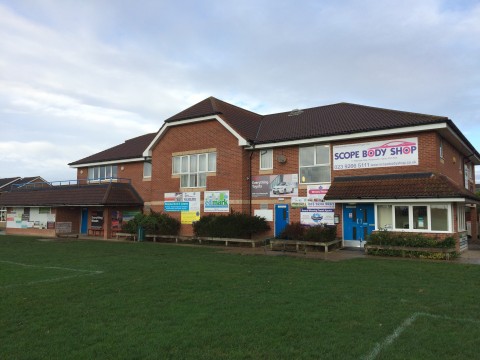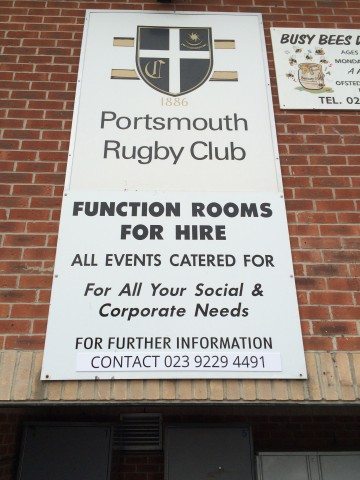Portsmouth Rugby Club is among a growing number of facilities now taking advantage of Sentinel Commercial’s KalGUARD, a highly successful electrolytic scale inhibitor kit that is scientifically proven to prevent limescale formation in hot water systems. The club turned to KalGUARD after discovering an extremely loud banging noise coming from one of its hot water boilers, which was then just five-years-old. The noise, known as ‘kettling’, is caused by an accumulation of limescale deposits on a boiler’s heat exchanger.
Portsmouth Rugby Club, which has history dating back to 1886, is today an extremely busy facility. Not only does the club boast five senior men’s teams (1st to 4th plus veterans), but also hosts ladies (Portsmouth Valkyries), colts and junior sides, as well as mini-rugby teams. During the rugby season, training takes place on Tuesdays and Thursdays, followed by matches at the weekends. The clubhouse, complete with two function rooms, a commercial kitchen, restaurant and bar facilities, is also used to host weddings, birthday parties and society dinners, seating up to 150 people. In short, it is an extremely busy facility and has an almost constant flow of visitors.
With all this in mind, a hot water boiler making a horrible clanging noise is hardly suitable, as House Manager Jim Dixon confirmed: “The construction of our current clubhouse was completed in 2000, and it was fitted with two boilers, both from a leading boiler manufacturer, serving the showers and kitchen with hot water. However, one day in 2005 we heard a terrific clattering noise, a kind of banging, come from one of the boilers. The whole thing was vibrating and, to be honest, it was pretty frightening. For all we knew it was about to explode, so we took the decision to turn it off and call the boiler manufacturer.”
The phenomenon described by Mr Dixon is known in the industry as ‘kettling’. The first clue to discovering why kettling occured at Portsmouth Rugby Club lies with its location. The club is situated in the Hilsea area of Portsmouth, where water hardness (a measure of the amount of calcium carbonate found in drinking water) is around 325 parts per million - in other words, it is extremely hard, and as such is prone to forming limescale deposits when heated. Unfortunately, around 65% of mainland England is served by hard water, and in such areas, limescale is both prevalent and extremely damaging to boilers and hot water systems.
Although kettling can in fact be caused by a number of different physical or mechanical issues, in hard water areas, limescale deposits are the likely culprit. Here, limescale accumulates on the surfaces of the boiler’s heat exchanger, which restricts the flow of water. When this happens the water becomes too hot and starts to steam, boil and therefore expand. This is what causes the noise, which in some cases sounds like a boiling kettle, thus prompting the name.
In addition to affecting the heat exchanger, limescale builds up in pipes, calorifiers and other heating system components. Wherever it accumulates, limescale can lead to reduced energy efficiency – in fact British Water states that just 1.6mm of limescale build-up can increase a heating system’s fuel requirement by as much as 12% - increased CO2 emissions, inadequate hot water supplies, component failures, and reduced boiler life. As a result, immediate repair can be a very cost effective course of action.
Said Mr Dixon: “The boiler manufacturer sent an engineer along to open up the boiler. He confirmed that heavy limescale deposits had formed on the heat exchanger surfaces. As a result, they had to make the necessary repairs, which cost around £1,000, a substantial sum to a club such as ours. To avoid the same thing happening again, the boiler manufacturer recommended installing KalGUARD from Sentinel Commercial.”
As a council-sponsored facility, Portsmouth Rugby Club had to approach the council with the idea of fitting KalGUARD (the council pays a proportion of costs relating to the boiler room). After completing the necessary funding application and approval process, the council arranged for a local contractor to install KalGUARD on the inlet pipe serving the two hot water boilers.
“Since the installation of KalGUARD in 2005 I’m very happy to report that we haven’t encountered any further noise episodes from either boiler. Furthermore, the boiler manufacturer performs an annual service and they report that the boilers look clean and scale-free inside,” said Mr Dixon.
Sentinel Commercial’s KalGUARD is a WRAS-approved electrolytic scale inhibitor device for commercial hot water systems, and represents a low maintenance way to protect facilities against the damaging and expensive impact of limescale. The technology it uses is listed in the UK Building Regulations Part L of the Building Services Compliance Guide and has been independently proven by Cranfield University as effective in preventing limescale build-up. Since a single unit is capable of protecting an entire location, KalGUARD offers an attractive value engineering proposition. In fact, its low maintenance design (the system does not waste water, does not use consumerables, and only a twice-yearly service is recommended) means that KalGUARD is able to deliver a return on investment in as little as 12 months compared with other Part L approved limescale prevention systems. The innovative unit comes with a controller which can be programmed into a site’s Building Management System (BMS), where fitted, enabling easy monitoring of its operation.
Although the energy efficiency of the boilers will have been improved with the installation of KalGUARD, determining the precise saving for Portsmouth Rugby Club is not straightforward. Mr Dixon said this is because the facility also has two additional boilers for its gas central heating and cooking facilities, making it tricky to apportion the exact savings. Instead, he cited one of the most noticeable differences as being the performance and reliability of the showers.
“Before KalGUARD, the club’s rugby players would frequently complain about the showers. The shower heads would often be so clogged with limescale that they would spray everywhere except on the person stood below. Alternatively, they would be reduced to little more than a trickle. Not much use when you’re covered in mud in either respect. We get no such complaints now however,” he said.
Portsmouth Rugby Club has eight changing rooms with multiple showers in each. Limescale is unattractive when encrusted on to shower heads and taps, and can be unhygienic, providing a place for bacteria to hide. Before KalGUARD was installed, the club had to clean the shower heads every 2-3 weeks, whereas now cleaning frequency is measured in months, not weeks.
Despite the heavy usage and hard water area, KalGUARD has proved to be extremely low maintenance. In fact, since 2005, the anode has only required replacing once, in 2010. According to the illuminated dial on the unit, the current anode is still showing 25% life.
“Without doubt I would recommend KalGUARD to other facilities in hard water areas, especially if they want to avoid a hefty repair bill like we had. KalGUARD is one of those technologies that you can’t see working, but you know it is. Our boilers and shower heads are undeniable evidence of that,” concluded Mr Dixon.


Sentinel is a company with a clear goal: we offer water treatment products and services that provide the best lifetime protection for heating and hot water systems. Originally launched in the UK by Grace Dearborn in 1988 and subsequently a subsidiary of the leading multinational General Electric, Sentinel has operated independently since 2005, expanding its international reach and range of innovative solutions. As of 2021, Sentinel is owned by Aalberts N.V., and sits in the hydronic flow control cluster.
